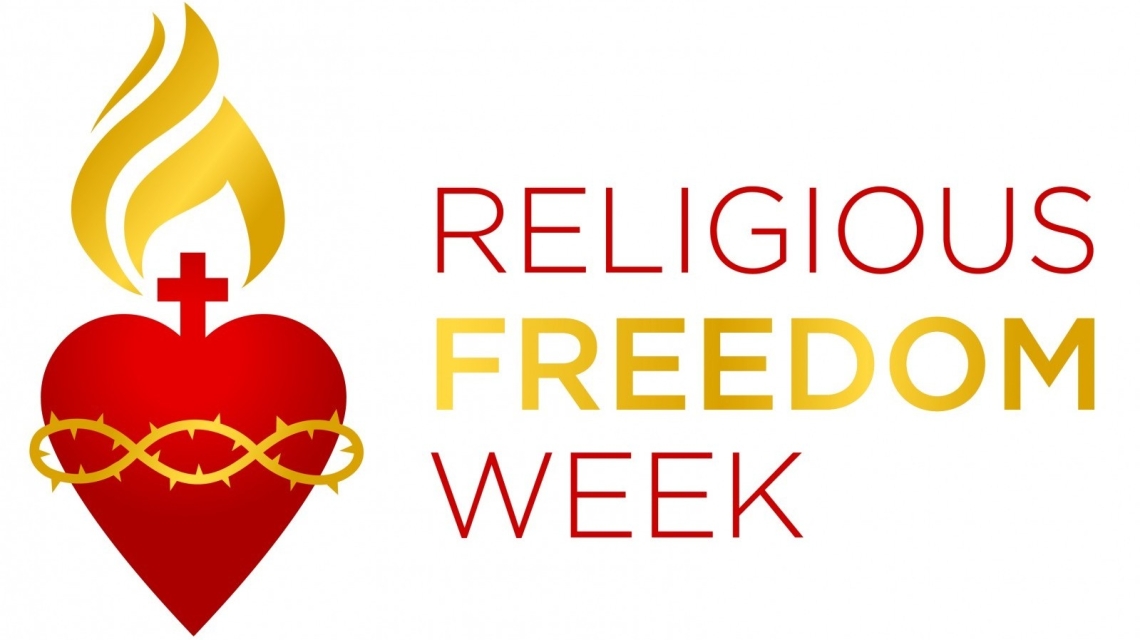Religious Freedom Week

The annual observance of Religious Freedom Week takes place June 22–29. It begins with the feast day of Ss. Thomas More and John Fisher, includes the Nativity of St. John the Baptist, and ends with the feast of Ss. Peter and Paul. The theme this year is “Witnesses to Hope."
Through prayer, education, and public action, Religious Freedom Week calls upon the faithful to promote the essential right of religious freedom for Catholics and for those of all faiths.
Pray, Reflect, Act
Bishop James Ruggieri joins the U.S. Bishops in inviting Catholics to pray, reflect, and act to promote religious freedom. In the links below, you will find a prayer, a reflection, and a suggested action for each day of Religious Freedom Week.
June 22 - Political Polarization
June 26 - Parental Choice in Education
June 27 - Immigration Services
June 28 - Freedom to serve the common good
Why must religious freedom be protected?
Religious freedom has recently become one of the major focal points in the conversation on how Americans can promote the common good. Our Catholic tradition has much to offer this conversation. In this time of increasing polarization in our culture, we can contribute to a better understanding of this issue in a way that respects all people. We can speak with friends and neighbors about religious freedom and work to clear up misconceptions about it.
Respect
Many religious freedom skeptics have plausible concerns. For example, they are concerned that all people should be treated with equal dignity. Indeed, the dignity of all people is the foundation for Catholic teaching on religious liberty. It is important that we not dismiss skeptics but, rather, that we listen to their concerns and take them seriously.
So, if the skeptics have a point, what do we say?
A Fundamental Right
Religious freedom is a fundamental right. It means that the government cannot coerce people into acting against their consciences. This is important for all people, not just people of faith. A government that makes one group choose obedience to the state over obedience to faith and conscience can force any group to submit to the state's demands. Religious freedom underlies all other freedoms for everyone.
Space to Serve Others
People of faith need religious freedom to have the space to serve others. Oftentimes, religious liberty disputes arise when religious organizations are expected to sacrifice aspects of their faith in order to continue to serve the surrounding community. But it is our faith that inspires us to serve.
Challenges to religious freedom often come from a mistaken view of religion, a view that sees religion as good only if it conforms to every value that happens to prevail today. However, the good that religious institutions do is inseparable from the parts that challenge prevailing norms. Religious convictions hang together, in and out of season. When faith groups violate their consciences, they undermine the whole mission of their ministry. People of faith and faith-based organizations need space to make their unique contributions to the common good.
Authentic Pluralism
Some express concern about the effects that religious organizations have on people who do not share those religious beliefs. They tend to see a conflict between religious freedom and their vision of equality and choose a mistaken concept of equality over freedom. These are certainly difficult issues. Here are points to consider:
- A pluralistic society makes space for people who hold views that run counter to the mainstream. Religious groups, and groups formed around a particular set of principles, need to be able to express their views with integrity. Should an animal rights organization be required by law to hire a member of a hunting association? Of course not. Then, for example, neither should a religious organization be required to hire people who oppose the teachings of that religion. It is crucial that our society not adopt the view that all groups – least of all religious groups -- must conform to one view. True freedom results in a diversity that strengthens, rather than weakens, society.
- Some say that religious people impose their faith on others. However, when religious groups are accused of causing harm to others, the "harm" is often that they do not facilitate an action. The craft store chain Hobby Lobby, for instance, refused to cover abortifacients for its employees. But Hobby Lobby is not preventing its employees from obtaining these devices. The Christian family that runs Hobby Lobby refuses to participate in an activity it believes is immoral.
- Above all, the Church seeks to offer a better way. Catholic teaching is holistic, rooted in the dignity of the person, a dignity that is visible to reason yet made clearer by the light of the Gospel of Jesus Christ. We are not simply asking for freedom from coercion so that we can be left alone. We believe that what we teach - about marriage, sex, family life, care for refugees, care for the poor, care for the sick, care for all vulnerable – is good for society. When we see a culture that is often unloving and hostile to life, we work to bear witness to a healthier culture, a "civilization of love," in which all people can flourish.
Own It
When we engage in conversation as Catholics, people want to know what we think. It's good to represent the Church and the beauty of her teachings; it's even better when we internalize those teachings and reflect on our own experiences and reasons for caring about religious freedom. Your friends and neighbors want to know what you think. You have a unique contribution to make to the conversation!









